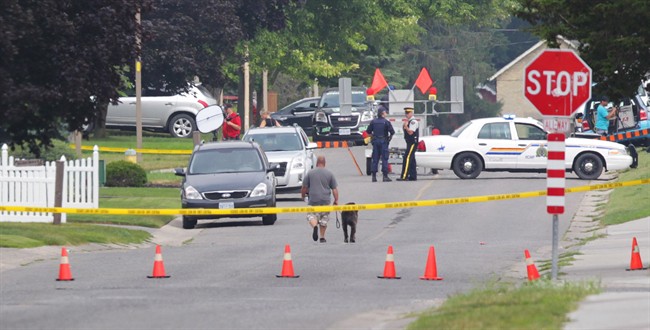An Ottawa man the RCMP had alleged might leave Canada to engage in terrorism has been ordered to give up his passport and stay away from supporters of the so-called Islamic State.

Abdulmuti Elmi, 24, was initially arrested for allegedly shoplifting from a liquor store and assaulting a man with a bottle but the RCMP had also sought a terrorism peace bond against him.
Crown prosecutors withdrew the terrorism peace bond case on Monday after Elmi was ordered to abide by 21 conditions stemming from his charges for robbery and assault with a weapon.
Those conditions ordered him not to leave Ontario, possess objects with the ISIS logo or view materials “that advocate or support the use of violence or espouse extremist or radical views.”
“Do not knowingly associate, communicate with or contact anyone who is involved in or supports terrorist activity … or anyone believed to hold radical religious views or supports ISIS/ISIL/Islamic State,” it said.

Get breaking National news
He must also maintain a curfew, not possess weapons, refrain from drug and alcohol use and “take any medication prescribed by your medical doctor and/or psychiatrist.”
Elmi signed the probation order in the Ontario Court of Justice. If he fails to comply with any of the conditions, he could face up to four years in prison and a fine of up to $5,000.

It is illegal to attempt to leave Canada to take part in terrorist activity. Faced with a surge in Canadians travelling abroad to join groups like ISIS, the RCMP has used terrorism peace bonds to ground those they suspect might be preparing to leave.
“Peace bonds assist in managing the threat posed by an individual where the evidence is assessed as insufficient to achieve charge approval,” according to a November 2016 RCMP document obtained by Global News. “They are a means of establishing some control over individuals short of a charge or conviction.”
But as a 2016 attempted suicide bombing in Ontario by ISIS supporter Aaron Driver demonstrated, peace bonds are not effective in some cases. “Peace bonds do not fully mitigate the risk posed by an individual,” the RCMP document said.
Stewart.Bell@globalnews.ca
- Trump doubles down after U.S. Supreme Court strikes down global tariffs
- Porter flight from Edmonton loses traction, slides off taxiway at Hamilton airport
- Coffee-hockey combo — or breakfast beers? — for bleary-eyed Olympic fans
- Are Canadian jobs any safer than before Trump’s tariffs were struck down?









Comments
Want to discuss? Please read our Commenting Policy first.